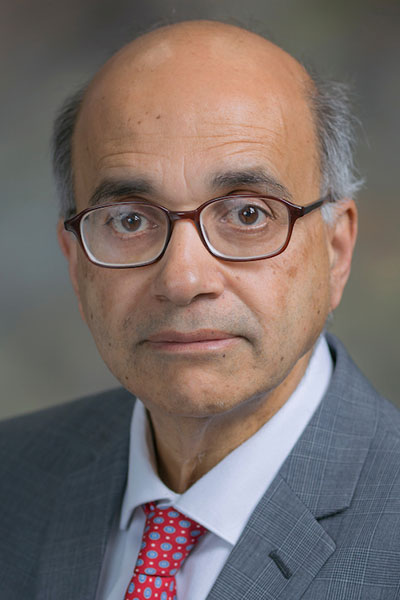While detecting cancer early seems like a good thing at the surface, weighing the risk-benefit ratio of early detection and screening for breast cancer can produce a hazy answer.

Earlier detection and earlier treatment doesn’t always translate to a beneficial effect on cancer mortality, explained Ismail Jatoi, MD, PhD, UT Health San Antonio Mays Cancer Center. “We need to look at the treatment interaction and intervene when treatment is most effective. If finding the disease a little bit later is just as effective as finding it earlier, then you have to wonder: Is there any real point to earlier detection?”
Dr. Jatoi will be the moderator for the San Antonio Breast Cancer Symposium® session Risk Reduction and Early Detection: Updates on Breast Cancer Screening on Wednesday, December 11, from noon to 1:45 p.m. CT in Stars at Night Ballroom 3-4 at the Henry B. Gonzalez Convention Center.
Presenters will explore topics including risk-based screening in the average population, novel imaging modalities, and screening for high-risk women.
“The whole point of screening and early detection is to find disease earlier with the aim of reducing mortality. Another important reason for early tests, of course, is to improve quality of life, and there might be less morbidity with the treatment,” Dr. Jatoi said. “For example, with small, localized, screen-detected breast cancers, breast-conserving surgery is generally feasible, but with larger tumors, mastectomy might be required.”
Despite these clear benefits, screening comes with risks, including the risk of false positives and the risk of overdiagnosis, which is the detection of lesions that would not have been detected without screening and would not have posed a threat to the life of the patient.
“Sometimes, screening may result in the detection of lesions that pose no threat to life and would never have been detected in the absence of screening, so overdiagnosis may result in unnecessary treatments (overtreatment),” Dr. Jatoi said, calling overdiagnosis a major public health issue that needs to be addressed.
Currently, novel breast cancer screening strategies are often implemented if they are shown to improve tumor detection rates, but Dr. Jatoi noted that tumor detection has not been validated as a proper surrogate outcome measure for mortality. He advocates moving away from tumor detection as a surrogate endpoint in cancer screening trials.
“We need to find better endpoints that are proper surrogates for mortality and proper surrogates for improved quality of life,” Dr. Jatoi said, adding that he hopes this need will be part of the discussion at the 2024 SABCS®.
“The underlying question surrounding this whole issue should not be about early detection in and of itself,” Dr. Jatoi continued. “Early detection is very strongly integrated with early treatment, so there is a strong treatment interaction associated with cancer screening.”
Given the nuances of early detection, striving for optimal timing of treatment for maximum efficacy remains the priority.
“Ultimately, the goal of screening and early detection is to reduce mortality and improve quality of life,” Dr. Jatoi said.
SABCS® 2024 app available now
Get the latest updates, customize your schedule, and stay connected with fellow attendees in the official app of the 2024 San Antonio Breast Cancer Symposium®. Find the SABCS® 2024 app today in the Apple App Store or Google Play Store.

